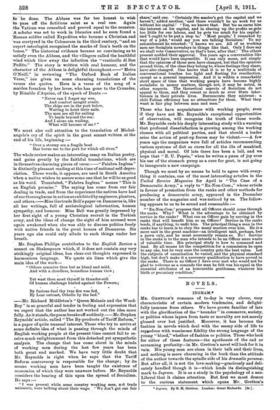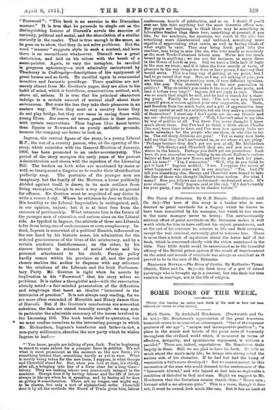NOVELS.
INGRA M.*
MR. Gurrroies romance of to-day is very clever, very characteristic of certain modern tendencies, and delight- fully immune from others. We have grown familiar of late with the glorification of the " bounder " in commerce, society, or politics whose lapses from taste or morality are not merely glossed over but justified. Moreover, it has become the fashion in novels which deal with the seamy side of life to reproduce with wearisome fidelity the strong language of the young " blood," whether of fashion or politics. Those who look for either of these features—the apotheosis of the cad or screaming profanity—in Mr. Gretton's novel will look for it in vain. His young men are clean in their talk and their lives, and nothing is more charming in the book than the attitude of the author towards the spindle side of his dramatis persona: But after all, it is not the love-making—graciously and deli- cately handled though it is—which lends its distinguishing mark to Ingram. It is as a study in the psychology of a neo- Liberal that it claims attention. But first we must demur to the curious statement which opens Mr.. Gretton's
• Ingram. By R. H. Grattan. London: Grant Richards. [6s.], " Foreword " " This book is an exercise in the Disraelian
manner." It is true that he proceeds to single out as the distinguishing feature of Disraeli's novels the exercise of
curiosity, political and social, and the stimulation of a similar curiosity in the reader. That is true enough in the sense, as he goes on to show, that they do not solve problems. But the word " manner " suggests style in such a context, and here there is no resemblance whatsoever. Disraeli was a great rhetorician, and laid on his colour with the brush of a scene-painter. Again, to vary the metaphor, he revelled in gorgeous upholstery—a trait admirably caricatured by
Thackeray in Codlingsby—descriptions of the equipment of great houses and so forth. He excelled again in ornamental invective and fantastic persiflage. These qualities are not
merely absent from Mr. Gretton's pages, they are alien to his habit of mind, which is fastidious, conscientious, critical, and, above all, serious. It is true that his principal characters indulge in a certain amount of mutual chaff about their seriousness. But none the less they take their pleasures in an austere way. When they meet at a country house they do not play bridge, but they row races in racing fours with young Blues. Res severe& est verwm gaudium is their motto, with certain reservations. Thus Ingram likes Ascot better than Epsom or Newmarket on purely aesthetic grounds, because the company are better to look at.
Ingram, the central figure of the story, is a young Liberal M.P., the son of a country parson, who, at the opening of the story, which coincides with the General Election of January, 1906, has been promoted to an under-secretaryship. The period of the story occupies the early years of the present Administration and closes with the rejection of the Licensing Bill. The leaders on both sides are mentioned by name or with so transparent a disguise as to render their identification perfectly easy. The portraits of the younger men are imaginary, but the family of the Mortons, a house politically divided against itself, is drawn in its main outlines from living exemplars, though in such a way as to give no ground for offence. 111r. Gretton must be acquitted of any desire to write a roman ei clef. Where he criticises he does so frankly.
His hostility to the Liberal Imperialists is undisguised, and, in our opinion, unjust ; but it is at least free from the excesses of partisanship. What interests him is the future of the younger men of education and serious aims on the Liberal side. As typified in Ingram, the attitude of these neo-Liberals is far from being one of cocksureness or even complacency. In- deed, Ingram is somewhat of a political Hamlet, influenced on the one hand by his historic sense, his admiration for the ordered graciousness of the lives of the aristocracy, and by a certain academic fastidiousness ; on the other, by his sincere interest in schemes of social reform and his personal attachment to his chiefs. Foreign policy hardly comes within his province at all, and the period chosen enables the author to dispense with any reference to the relations of the Liberals and the Irish Parliamen- tary Party. Mr. Gretton is right when he asserts by implication in his " Foreword " that his story solves no problems. It is rather a thoughtful and—with the reservation already noted—a fair-minded presentation of the difficulties and misgivings that beset an idealist " immersed in the intricacies of practice." It is not always easy reading, for we are more often reminded of Meredith and Henry James than of Disraeli. But if Mr. Gretton's conclusions are somewhat nebulous, the data are stated honestly enough : we may note in particular the admirable summary of the issues involved in the Licensing Bill. The book lends itself to quotation, but we must confine ourselves to the interesting passage in which Mr. Richardson, Ingram's benefactor and father-in-law, a non-party millionaire, sketches the new party which he wishes Ingram to lead :— " You know, people are talking of you, Jack. You're beginning to stand to some extent for a younger force in politics. It's not what is most prominent at the moment as the new force ; it's something behind that, something hardly as yet in view. What is mostly being taken for the new force, I suppose, is what George and Churchill stand for. But, when you look at that, it's chiefly, after all, a bringing into line of a force clear for a long time— labour. They are making labour men consciously integral in the machine. George does it by having labour and the life of labour always in his eye when he is speaking, and by basing all he does on giving it consideration. There are no longer, one might say, to be classes, but only a sort of alphabetical order. Churchill does it by all the methods the Board of Trade gives him, labour
conferences, boards of arbitration, and so on. I doubt if you'll ever see him take anything but the most domestic offices now. But people are be'nnng to think there may be something in Liberalism fresher than these two; something at present, if you like, far too academic, too amateur, too much in the air ; but something more disinterested and unbiased, something more capable of appreciating what exists, as well as having ideals of what ought to exist. That may bring fresh grist into the machine, may bring in men like me, who vote nearly as massively as the most Trade-ITnionised labour man. We're not too much bound up in anything ; we can see, for instance, as many flaws in the House of Lords as you. But we want a little lack of logic in the men we trust; and if it takes the form merely of taste, of pleasure in the way things are done or have grown, I dare say that would serve. This is a long way of getting at my point, but I had to go round that way. Men, as I say, are talking of you ; you are human. I'm always meeting men, of very different opinions, who like you. Why shouldn't you be the new generation in politics? Why shouldn't you make it the core of your party, and lead it before very long ? ' Ingram did not reply at once. There was so much that might be said, and he had to search for a start- ing point. Finally he chose one : I'm not sure you haven't yourself given a reason against your own suggestion, sir. Taste, and freedom from too much logic, and a gift of appreciation may be very useful as salt in a mixture, but can they make a compound of themselves ? I must say I don't quite see us—my friends and my set—developing as a party.' Well, I haven't come to my idea. by way of politics at all. You know I've never thought I knew much about them. But I've had to think a little about Charlie [his son] from time to time, and I've seen how queerly links are made nowadays for the people who use them, or who like to try
to. The old sharp divisions are gone.' Yet so many men have told me that they don't understand us, or see where we are going.' `Perhaps because they don't yet see you at all,' Mr. Richardson said. 'It's George and Churchill they see, and you men some- where in the bunch. Perhaps you don't yet see yourselves. Look here, do you remember once talking to me about Balfour's curious failure at first in the new House, and how ho got back his place, and his tone ? " Yes, I remember." Well, why do you think he got it back ? ' Ingram nodded : I see. I suppose the secret of what happened was some salt in our mixture.' Yes. And I'll tell you something else. George and Churchill were bound to take the line of those who thought Balfour's tone useless. See what I mean? Now you fellows can understand—understand much. It's your chance.' Well,' Ingram said at the end, if I don't exactly see your party, I can believe in its shadow before.'"











































 Previous page
Previous page